2023年外研版中考英语一轮复习九年级上册Module7-9课本(含答案)
文档属性
| 名称 | 2023年外研版中考英语一轮复习九年级上册Module7-9课本(含答案) | 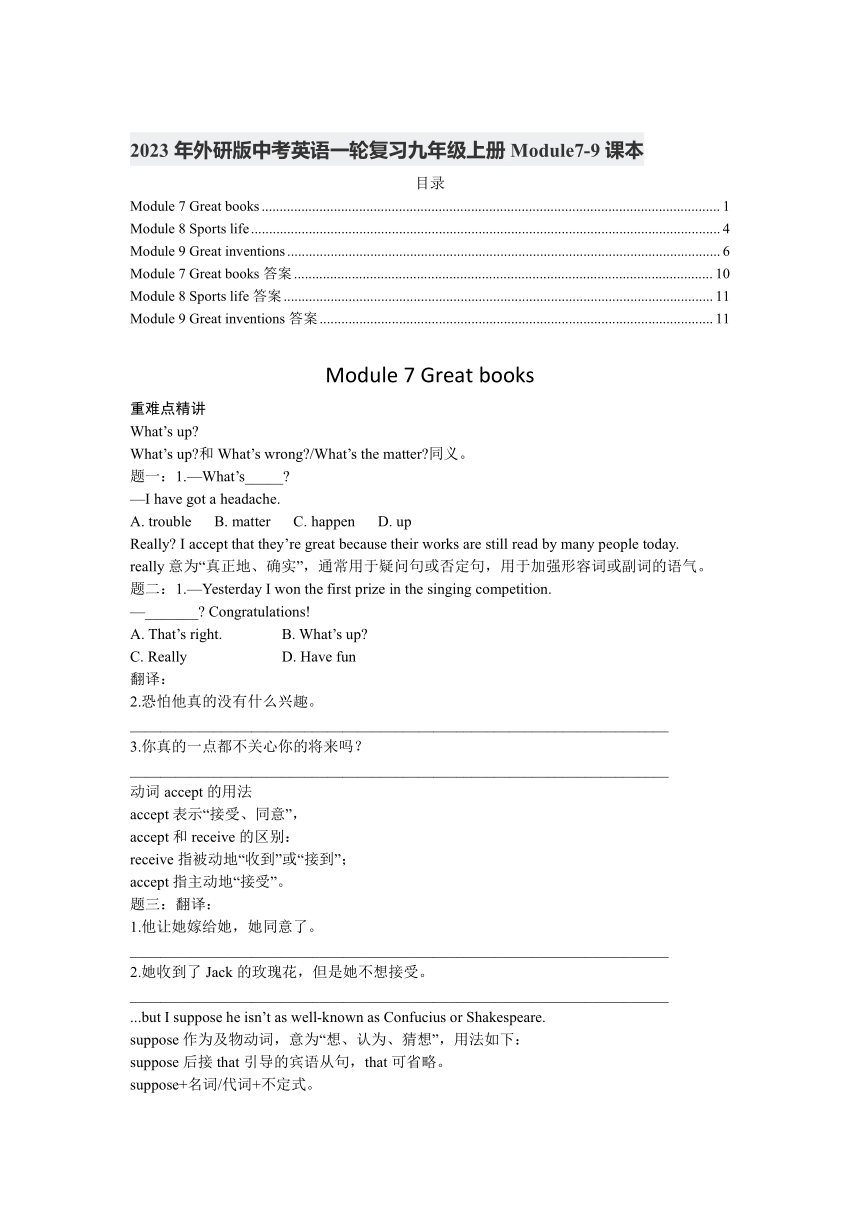 | |
| 格式 | docx | ||
| 文件大小 | 32.9KB | ||
| 资源类型 | 教案 | ||
| 版本资源 | 外研版 | ||
| 科目 | 英语 | ||
| 更新时间 | 2023-02-20 15:38:29 | ||
图片预览

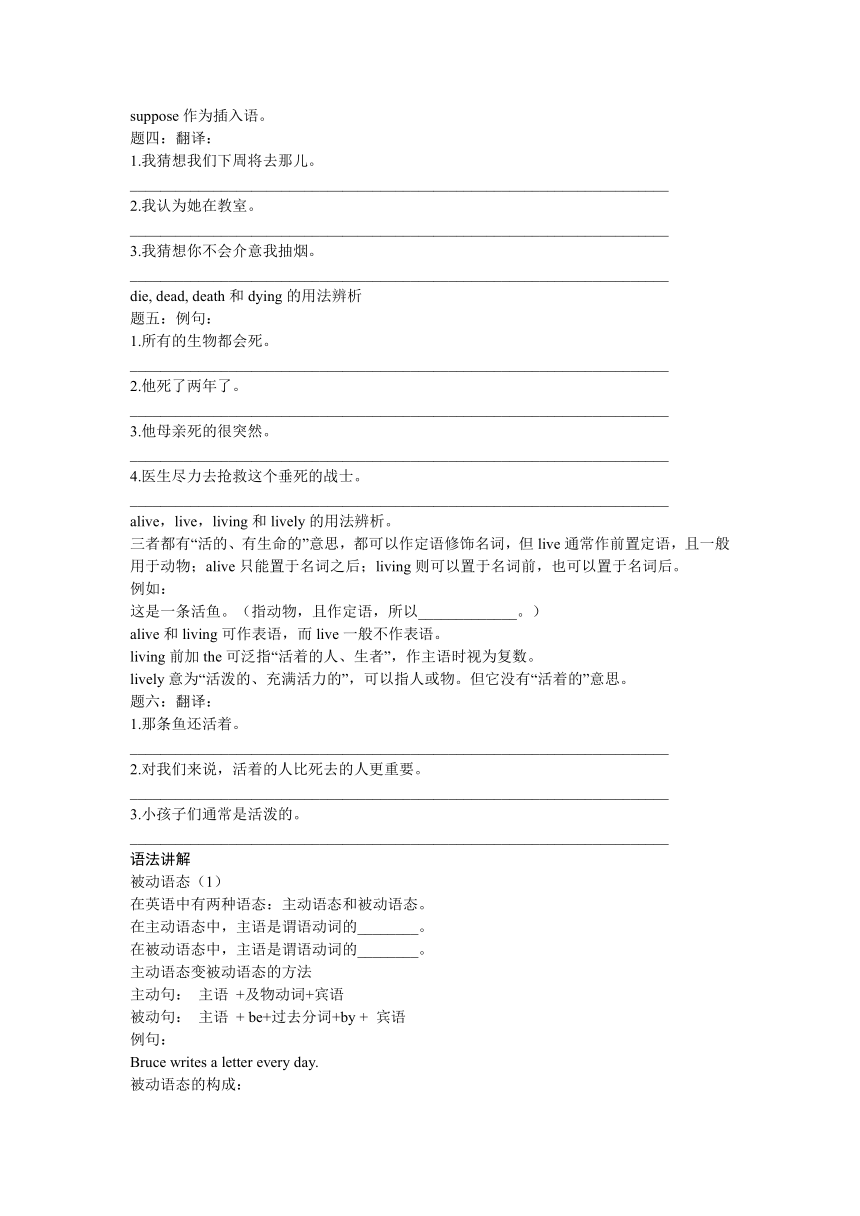
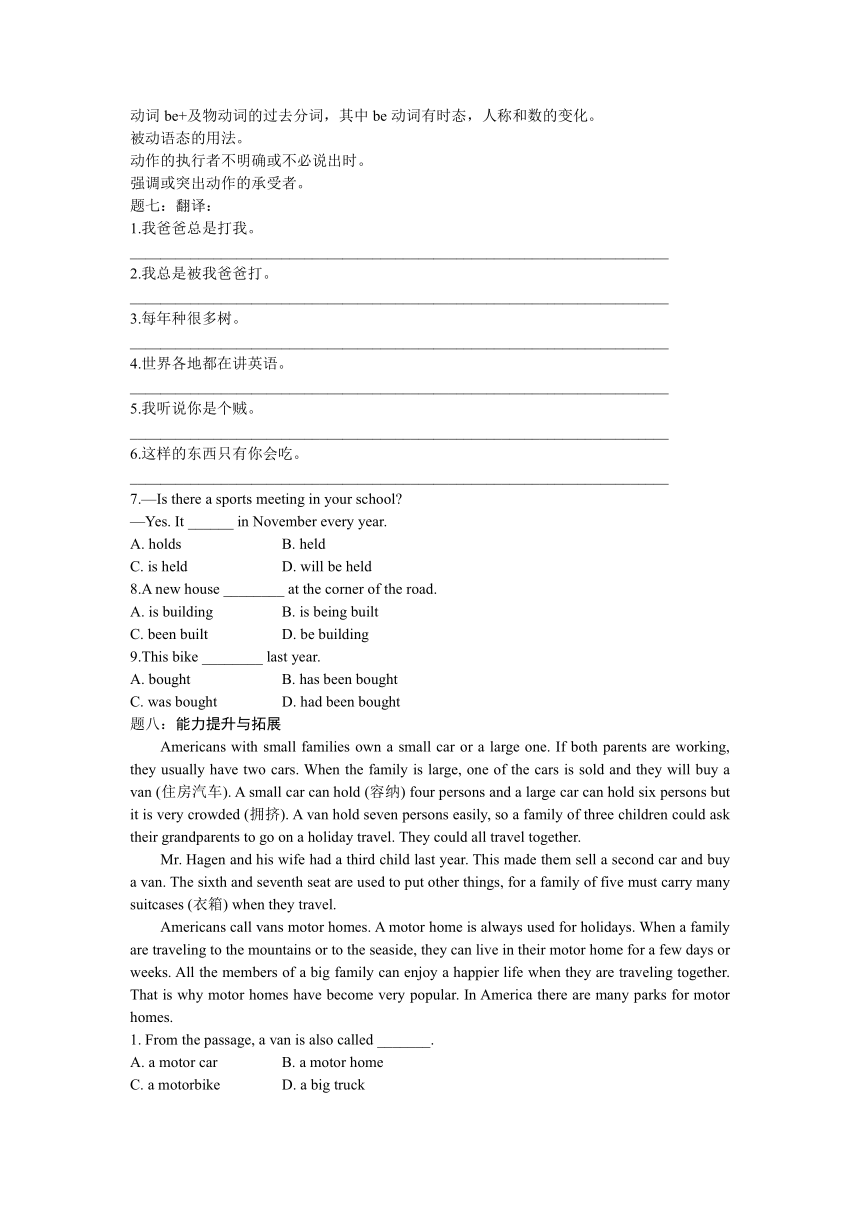
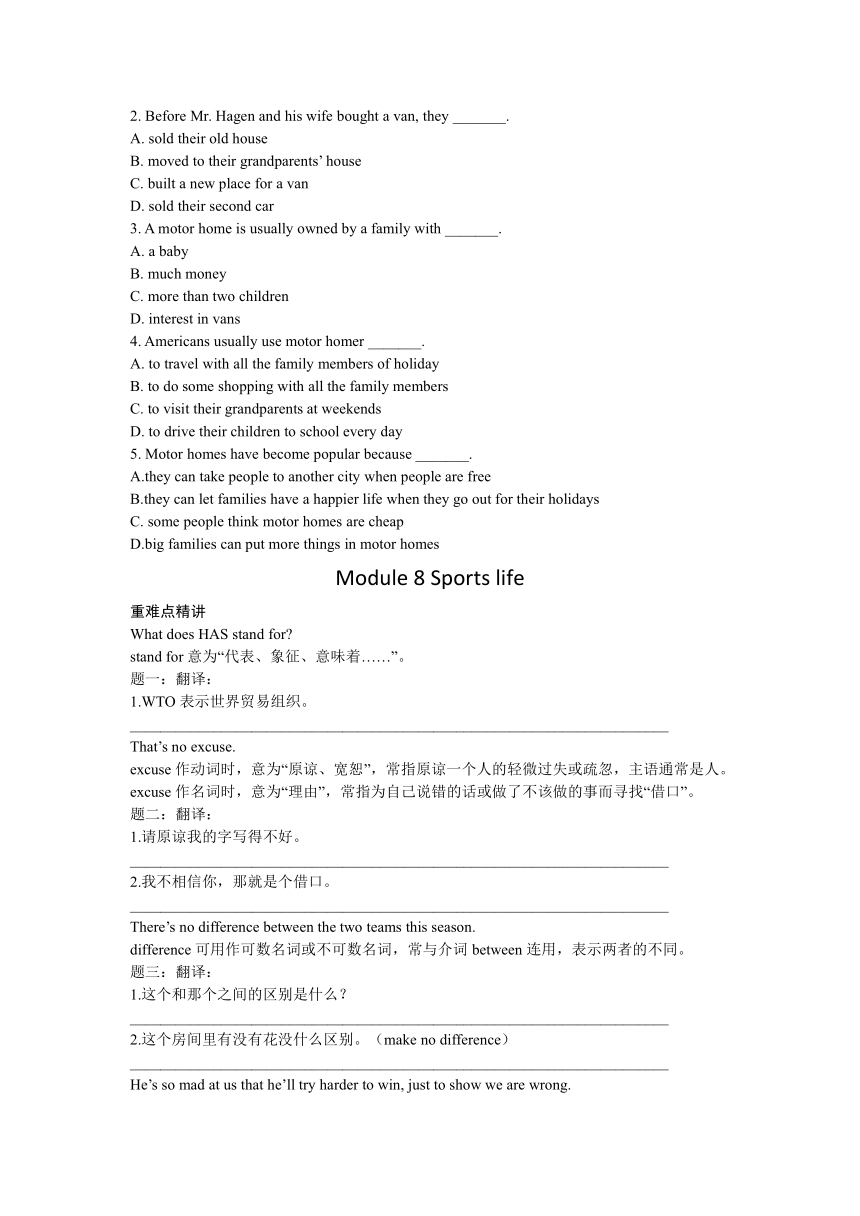
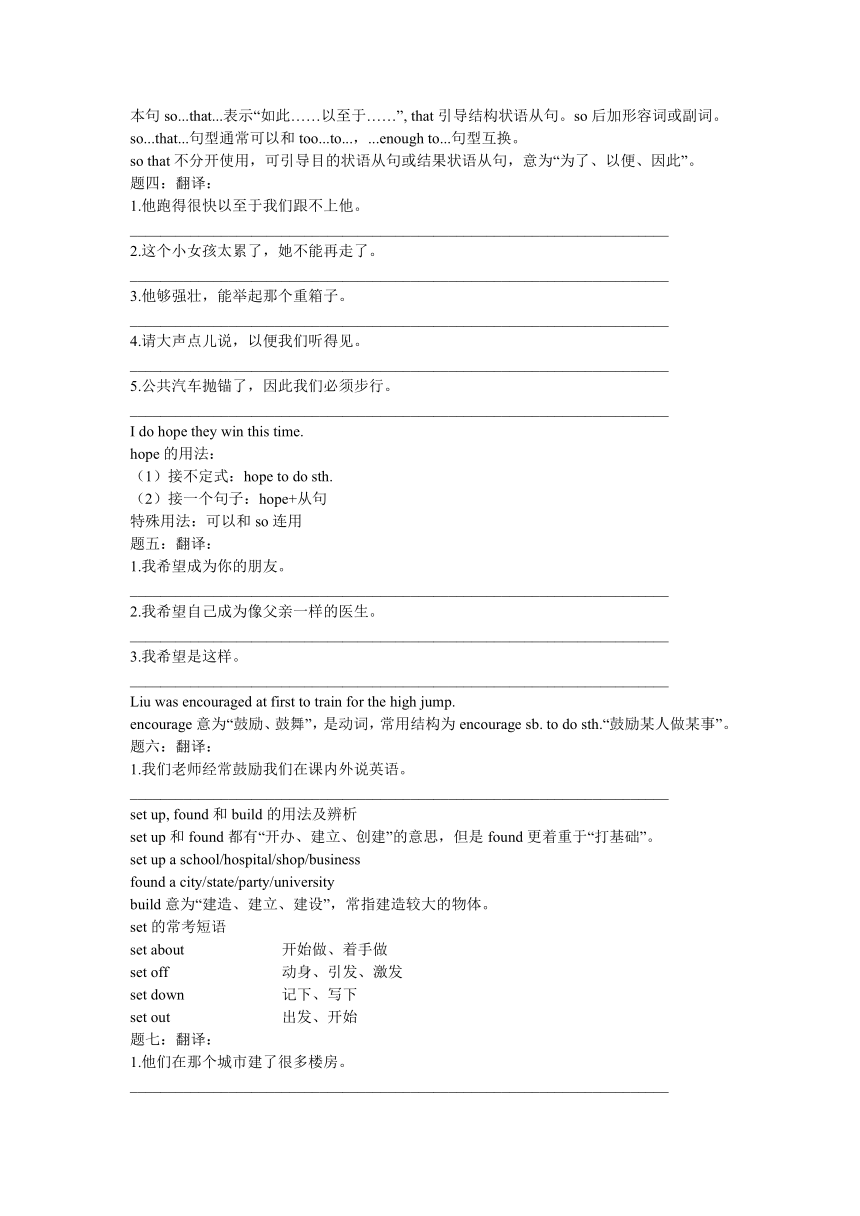
文档简介
2023年外研版中考英语一轮复习九年级上册Module7-9课本
目录
Module 7 Great books 1
Module 8 Sports life 4
Module 9 Great inventions 6
Module 7 Great books答案 10
Module 8 Sports life答案 11
Module 9 Great inventions答案 11
Module 7 Great books
重难点精讲
What’s up
What’s up 和What’s wrong /What’s the matter 同义。
题一:1.—What’s_____
—I have got a headache.
A. trouble B. matter C. happen D. up
Really I accept that they’re great because their works are still read by many people today.
really意为“真正地、确实”,通常用于疑问句或否定句,用于加强形容词或副词的语气。
题二:1.—Yesterday I won the first prize in the singing competition.
—_______ Congratulations!
A. That’s right. B. What’s up
C. Really D. Have fun
翻译:
2.恐怕他真的没有什么兴趣。
_______________________________________________________________________
3.你真的一点都不关心你的将来吗?
_______________________________________________________________________
动词accept的用法
accept表示“接受、同意”,
accept和receive的区别:
receive指被动地“收到”或“接到”;
accept指主动地“接受”。
题三:翻译:
1.他让她嫁给她,她同意了。
_______________________________________________________________________
2.她收到了Jack的玫瑰花,但是她不想接受。
_______________________________________________________________________
...but I suppose he isn’t as well-known as Confucius or Shakespeare.
suppose作为及物动词,意为“想、认为、猜想”,用法如下:
suppose后接that引导的宾语从句,that可省略。
suppose+名词/代词+不定式。
suppose作为插入语。
题四:翻译:
1.我猜想我们下周将去那儿。
_______________________________________________________________________
2.我认为她在教室。
_______________________________________________________________________
3.我猜想你不会介意我抽烟。
_______________________________________________________________________
die, dead, death和dying的用法辨析
题五:例句:
1.所有的生物都会死。
_______________________________________________________________________
2.他死了两年了。
_______________________________________________________________________
3.他母亲死的很突然。
_______________________________________________________________________
4.医生尽力去抢救这个垂死的战士。
_______________________________________________________________________
alive,live,living和lively的用法辨析。
三者都有“活的、有生命的”意思,都可以作定语修饰名词,但live通常作前置定语,且一般用于动物;alive只能置于名词之后;living则可以置于名词前,也可以置于名词后。
例如:
这是一条活鱼。(指动物,且作定语,所以_____________。)
alive和living可作表语,而live一般不作表语。
living前加the可泛指“活着的人、生者”,作主语时视为复数。
lively意为“活泼的、充满活力的”,可以指人或物。但它没有“活着的”意思。
题六:翻译:
1.那条鱼还活着。
_______________________________________________________________________
2.对我们来说,活着的人比死去的人更重要。
_______________________________________________________________________
3.小孩子们通常是活泼的。
_______________________________________________________________________
语法讲解
被动语态(1)
在英语中有两种语态:主动语态和被动语态。
在主动语态中,主语是谓语动词的________。
在被动语态中,主语是谓语动词的________。
主动语态变被动语态的方法
主动句: 主语 +及物动词+宾语
被动句: 主语 + be+过去分词+by + 宾语
例句:
Bruce writes a letter every day.
被动语态的构成:
动词be+及物动词的过去分词,其中be动词有时态,人称和数的变化。
被动语态的用法。
动作的执行者不明确或不必说出时。
强调或突出动作的承受者。
题七:翻译:
1.我爸爸总是打我。
_______________________________________________________________________
2.我总是被我爸爸打。
_______________________________________________________________________
3.每年种很多树。
_______________________________________________________________________
4.世界各地都在讲英语。
_______________________________________________________________________
5.我听说你是个贼。
_______________________________________________________________________
6.这样的东西只有你会吃。
_______________________________________________________________________
7.—Is there a sports meeting in your school
—Yes. It ______ in November every year.
A. holds B. held
C. is held D. will be held
8.A new house ________ at the corner of the road.
A. is building B. is being built
C. been built D. be building
9.This bike ________ last year.
A. bought B. has been bought
C. was bought D. had been bought
题八:能力提升与拓展
Americans with small families own a small car or a large one. If both parents are working, they usually have two cars. When the family is large, one of the cars is sold and they will buy a van (住房汽车). A small car can hold (容纳) four persons and a large car can hold six persons but it is very crowded (拥挤). A van hold seven persons easily, so a family of three children could ask their grandparents to go on a holiday travel. They could all travel together.
Mr. Hagen and his wife had a third child last year. This made them sell a second car and buy a van. The sixth and seventh seat are used to put other things, for a family of five must carry many suitcases (衣箱) when they travel.
Americans call vans motor homes. A motor home is always used for holidays. When a family are traveling to the mountains or to the seaside, they can live in their motor home for a few days or weeks. All the members of a big family can enjoy a happier life when they are traveling together. That is why motor homes have become very popular. In America there are many parks for motor homes.
1. From the passage, a van is also called _______.
A. a motor car B. a motor home
C. a motorbike D. a big truck
2. Before Mr. Hagen and his wife bought a van, they _______.
A. sold their old house
B. moved to their grandparents’ house
C. built a new place for a van
D. sold their second car
3. A motor home is usually owned by a family with _______.
A. a baby
B. much money
C. more than two children
D. interest in vans
4. Americans usually use motor homer _______.
A. to travel with all the family members of holiday
B. to do some shopping with all the family members
C. to visit their grandparents at weekends
D. to drive their children to school every day
5. Motor homes have become popular because _______.
A.they can take people to another city when people are free
B.they can let families have a happier life when they go out for their holidays
C. some people think motor homes are cheap
D.big families can put more things in motor homes
Module 8 Sports life
重难点精讲
What does HAS stand for
stand for意为“代表、象征、意味着……”。
题一:翻译:
1.WTO表示世界贸易组织。
_______________________________________________________________________
That’s no excuse.
excuse作动词时,意为“原谅、宽恕”,常指原谅一个人的轻微过失或疏忽,主语通常是人。
excuse作名词时,意为“理由”,常指为自己说错的话或做了不该做的事而寻找“借口”。
题二:翻译:
1.请原谅我的字写得不好。
_______________________________________________________________________
2.我不相信你,那就是个借口。
_______________________________________________________________________
There’s no difference between the two teams this season.
difference可用作可数名词或不可数名词,常与介词between连用,表示两者的不同。
题三:翻译:
1.这个和那个之间的区别是什么?
_______________________________________________________________________
2.这个房间里有没有花没什么区别。(make no difference)
_______________________________________________________________________
He’s so mad at us that he’ll try harder to win, just to show we are wrong.
本句so...that...表示“如此……以至于……”, that引导结构状语从句。so后加形容词或副词。
so...that...句型通常可以和too...to...,...enough to...句型互换。
so that不分开使用,可引导目的状语从句或结果状语从句,意为“为了、以便、因此”。
题四:翻译:
1.他跑得很快以至于我们跟不上他。
_______________________________________________________________________
2.这个小女孩太累了,她不能再走了。
_______________________________________________________________________
3.他够强壮,能举起那个重箱子。
_______________________________________________________________________
4.请大声点儿说,以便我们听得见。
_______________________________________________________________________
5.公共汽车抛锚了,因此我们必须步行。
_______________________________________________________________________
I do hope they win this time.
hope的用法:
(1)接不定式:hope to do sth.
(2)接一个句子:hope+从句
特殊用法:可以和so连用
题五:翻译:
1.我希望成为你的朋友。
_______________________________________________________________________
2.我希望自己成为像父亲一样的医生。
_______________________________________________________________________
3.我希望是这样。
_______________________________________________________________________
Liu was encouraged at first to train for the high jump.
encourage意为“鼓励、鼓舞”,是动词,常用结构为encourage sb. to do sth.“鼓励某人做某事”。
题六:翻译:
1.我们老师经常鼓励我们在课内外说英语。
_______________________________________________________________________
set up, found和build的用法及辨析
set up和found都有“开办、建立、创建”的意思,但是found更着重于“打基础”。
set up a school/hospital/shop/business
found a city/state/party/university
build意为“建造、建立、建设”,常指建造较大的物体。
set的常考短语
set about 开始做、着手做
set off 动身、引发、激发
set down 记下、写下
set out 出发、开始
题七:翻译:
1.他们在那个城市建了很多楼房。
_______________________________________________________________________
语法讲解
被动语态(2)
结构展示:以do为例
主动语态和被动语态转化的口诀:
宾变主,把“是”补;动词跟,变过分,时与数,“be”随主;过去时,was单were为复。
题八:变被动语态。
1. The teacher told them to come early yesterday.
_______________________________________________________________________
2. The workers built that bridge three years ago.
_______________________________________________________________________
3. I bought a new computer yesterday.
_______________________________________________________________________
题九:能力提升与拓展
“Dreams (梦) may be more important than sleep. We all need to dream,” some scientists say.
Dreams take up(占据) about one quarter of our sleeping time. People have several dreams each night. Dreams are like short films. They are usually in color. Some dreams are like old films. They come to us over and over again. That maybe because the dreamer is worrying about something. Dreaming may be a way of trying to find an answer.
Some people get new ideas about their work from dreams. They may(可能) have been thinking about their work all day. These thoughts can carry over(携入) into dreams.
Sometimes we wake up with a good feeling from a dream. But often we can’t remember the dream. Dreams can disappear (消失) quickly from memory (记忆).
Too much dreaming can be harmful (有害的). The more we sleep, the longer we dream. The mind is hard at work when we dream. That is why we may have a long sleep and still wake up tired.
1. It may be less important to sleep than to____.
A. think B. dream C. work D. study
2. Dreams and films are usually ____.
A. very long B. in color
C. about work D. very sad
3. Why do some people often dream about their work
A. Because they are tired in the daytime.
B. Because they are not interested in their work.
C. Because they may be thinking about their work all day.
D. Because they have too much work to do.
4. The main idea of the story is that ____.
A. what dream is
B. people like to sleep
C. dreams are like films
D. we always remember dreams
Module 9 Great inventions
重难点精讲
They will be put up on the school website.
put up意为“公布、张贴”,后接代词作宾语的时候,要把代词放在动词和副词之间。
题一:翻译:
1.她把头发挽在头上。
_______________________________________________________________________
2.为什么不写张纸条张贴在墙上呢?
_______________________________________________________________________
When I was at school, we waited for weeks to hear from pen friends abroad.
hear from意为“收到……的信,得到……的消息”,相当于get a letter from sb.。
注意:
hear from的宾语是“人”,而不是“信”。
你多长时间接到你姐姐的信?
How often do you____ ____ your sister
题二:翻译:
1.我已经很长时间没有收到你的来信了。
_______________________________________________________________________
Here it is.
Here it is.及Here you are.是找到了东西,或递东西时的用语。意为“给、拿去吧、这是你所要的(东西)”等。
题三:1.—May I use your phone
—Of course.________.
A. Very well. B. Take it easy
C. Here you are D. Sounds great
I haven’t used it since your mom’s birthday.
since+时间点,表示“自从……(过去某时)以来”,其着眼点是过去某时,即表示自过去某时延续至今的一段时间,常与完成时连用。Since既可以作介词,也可以作从属连词。
题四:翻译:
1.自2006年以来,她就在这里工作。
_______________________________________________________________________
2.自毕业以来,她就在这里工作。
_______________________________________________________________________
for+时间段,表示“(延续)……之久”,其着眼点是现在,即表示延续到现在的一段时间,常与完成时连用。
题五:翻译:
1.他们在中国已经住了两年了。
_______________________________________________________________________
2.—How long have you stayed in this hotel
—Not long, just ______ this Monday.
A. from B. since C. for D. on
Today, the Web has hundreds of millions of users.
题六: ______ people lost their homes in Japan’s earthquake.
A. Two thousands B. Thousand
C. Thousands of D. Thousand of
But it seems impossible to imagine without them.
seem常作系动词,有“好像、似乎”的意思,后面可跟动词不定式或形容词作表语。
在It seems that... 或It seemed that...句型中,it为形式主语,that引导的从句是真正的主语,表示“看起来……”。
题七:翻译:
1.她好像非常高兴。
_______________________________________________________________________
2.他的体温似乎完全正常。
_______________________________________________________________________
3.他们似乎不喜欢这个主意。
_______________________________________________________________________
4.好像谁也不了解这件事。
_______________________________________________________________________
at a time, at one time, at times
at a time表示“每次、一次”。
at one time表示“曾经、一度”。
at times表示“有时、偶尔”。
题八:翻译:
1.医生告诉我每次服药三粒。
_______________________________________________________________________
2.过去有段时间,我每天下午都踢足球。
_______________________________________________________________________
3.每个人偶尔都会犯一些错误。
_______________________________________________________________________
be made+介词的用法。
be made of 看的出原材料
be made from 看不出原材料
be made in
在……制造,in后常接时间或地点。
be made up of 由……构成
be made by
被……制成,by后常接动作的执行者
be made into 被制成……
题九:翻译:
1.这座桥是用石头造的。
_______________________________________________________________________
2.面包是用小麦制成的。
_______________________________________________________________________
3.这辆车是在中国制造的。
_______________________________________________________________________
4.我们班由六个组组成。
_______________________________________________________________________
5.这台机器是由中国工人制造的。
_______________________________________________________________________
6.玻璃通常被制成瓶子。
_______________________________________________________________________
语法讲解
一般将来时的被动语态
一般将来时的被动语态的肯定式为:will +be +done。
一般将来时的被动语态的否定式为:will+ not +be +done。
一般将来时的被动语态的一般疑问句需将will提到主语的前面。
一般将来时的被动语态的特殊疑问句为:疑问词+will+主语+be done。
一般将来时的被动语态的其他结构:
be going to be done
be to be done
题十:翻译:
1.如果你违反规定,你将受到惩罚。
_______________________________________________________________________
2.运动会将不会推迟到下周。
_______________________________________________________________________
3.—这项工作会立刻被完成吗?
—是的,立刻就完成。
_______________________________________________________________________
_______________________________________________________________________
4.这些书将在什么时候出版?
_______________________________________________________________________
5.这个问题将不会在明天的会议上讨论。
_______________________________________________________________________
6.今晚将不会修理这些机器。
_______________________________________________________________________
题十一:能力提升与拓展
We know the mosquito very well. Mosquitoes fly everywhere. They can be found almost all over the world, and there are more than 2,500 kinds of them.
No one likes the mosquito. But the mosquito may decide that she loves you. She Yes, she. It’s true that male mosquito doesn’t bite(咬) and only the female mosquito bites because she needs blood to lay eggs. She is always looking for things or people she wants to bite. If she likes what she finds, she bites. But if she doesn’t like your blood, she will turn to someone else for more delicious blood. Next time a mosquito bites you, just remember you are chosen. You’re different from the others!
If the mosquito likes you, she lands on your body without letting you know. She bites you so quickly and quietly that you may not feel anything different. After she bites, you will have an itch(痒) on your body because she puts something from her mouth together with your blood. By the time the itching begins, and she has flown away.
And then what happens Well, after her delicious dinner, the mosquito feels tired. She just wants to find a place to have a good rest. There, on a leaf or a wall, she begins to lay eggs, hundreds of eggs.
1. “Mosquito” means _______ in Chinese.
A. 苍蝇 B. 蜻蜓 C. 跳蚤 D. 蚊子
2. We know mosquitoes very well because ___________.
A. they can be found easily
B. they fly here and there
C. there are many kinds of them
D. they can fly
3. If the mosquito doesn’t bite you, it will ________.
A. get angry with you
B. be afraid of you
C. make a lot of noise
D. choose another one
4. The mosquito bites you _________.
A. when you’re asleep
B. because you have choose it
C. too quickly to let you know
D. but doesn’t like you
5. Which of the following sentences is wrong
A. The itching begins after the mosquito bites you.
B. You feel terrible when the mosquito bites you.
C. Mosquitoes use blood to lay eggs.
D. All the mosquitoes don’t like to bite people for blood.
答案:
Module 7 Great books答案
题一:1.D
题二:1.C; 2.I’m afraid he isn’t really interested in it.
3.Do you really care nothing about your future
题三:1.He asked her to marry him and she accepted it.
2.She received Jack’s roses but she didn’t want to accept them.
题四:1.I suppose (that) we will go there next week.
2.I supposed her to be in the classroom.
3.You don’t mind my smoking, I suppose.
题五:1.All the livings will die.
2.He has been dead for two years. / He died two years ago.
3.The death of his mother was a sudden.
4.The doctors tried to save this dying soldier.
题六:1.That fish is alive./That fish is living.
2.To us, the livings are more important than the dead.
3.The kids are often/usually/always lively.
题七:1.My father always beats me.
2.I’m always beaten by my father.
3.Many trees are planted every year.
4.English is spoken (by many people) around the world.
5.I was told that you were a thief.
6.Such things are only eaten by you.
7.C; 8. B; 9. C
题八:1.B; 2. D; 3. C; 4. A; 5. B
Module 8 Sports life答案
题一:1.WTO stands for the World Trade Organization.
题二:1.Please excuse my bad handwriting.
2.I don’t believe you. That is an excuse.
题三:1.What is the difference between this one and that one
2.Flowers make no difference to this room.
题四:1.He runs/ran so fast that we can’t/couldn’t keep up with him.
2.This little girl was so tired that she couldn’t walk (any) farther. /This little girl was too tired to walk (any) farther.
3.He is so strong that he can lift the heavy case. / He is strong enough to lift the heavy case.
4.Please speak louder so that we could hear you.
5.The bus broke down so that we had to walk.
题五:1.I hope to be friends with you.
2.I hope that I can be a doctor like my father.
3.I hope so.
题六:1.Our teacher often encourages us to speak English in and out of class.
题七:1.They built many buildings in that city. / Many buildings were built by them in that city.
题八:1.They were told to come by the teacher early yesterday.
2.That bridge was built by the workers three years ago.
3.A new computer was bought by me yesterday.
题九:1.B; 2. B; 3. C; 4. A
Module 9 Great inventions答案
题一:1.She put her hair up.
2.Why not write a note and put it up on the wall
题二:1.I haven’t heard from you for a long time.
题三:1.C
题四:1.She has worked here since 2006.
2.She has worked here since she left school.
题五:1.They have lived/been in China for two years. ; 2.B
题六:1.C
题七:1.She seems/seemed very happy.
2.His temperature seemed to be all right.
3.It seemed that they didn’t like this idea.
4.It seemed that nobody knew the matter.
题八:1.The doctor told/tells me to take three pills at a time.
2.At one time, I used to play soccer every afternoon.
3.Everyone/Everybody makes mistakes at times.
题九:1.This bridge is made of stone.
2.The bread is made from the wheat.
3.This car is made in China.
4.Our class is made up of six groups.
5.This machine is made by Chinese workers.
6.Glass is usually made into bottles.
题十:1.If you break the rules, you will be punished/fined.
2.The sports meeting won’t be put off/delayed till next week.
3.—Will this work/task be finished/done at once/right away
—Yes, it will be.
4.When will these books be published
5.This problem/question isn’t going to be discussed at the meeting tomorrow.
6.These machines aren’t to be repaired tonight.
题十一:1.D; 2. B; 3. D; 4. C; 5. D
目录
Module 7 Great books 1
Module 8 Sports life 4
Module 9 Great inventions 6
Module 7 Great books答案 10
Module 8 Sports life答案 11
Module 9 Great inventions答案 11
Module 7 Great books
重难点精讲
What’s up
What’s up 和What’s wrong /What’s the matter 同义。
题一:1.—What’s_____
—I have got a headache.
A. trouble B. matter C. happen D. up
Really I accept that they’re great because their works are still read by many people today.
really意为“真正地、确实”,通常用于疑问句或否定句,用于加强形容词或副词的语气。
题二:1.—Yesterday I won the first prize in the singing competition.
—_______ Congratulations!
A. That’s right. B. What’s up
C. Really D. Have fun
翻译:
2.恐怕他真的没有什么兴趣。
_______________________________________________________________________
3.你真的一点都不关心你的将来吗?
_______________________________________________________________________
动词accept的用法
accept表示“接受、同意”,
accept和receive的区别:
receive指被动地“收到”或“接到”;
accept指主动地“接受”。
题三:翻译:
1.他让她嫁给她,她同意了。
_______________________________________________________________________
2.她收到了Jack的玫瑰花,但是她不想接受。
_______________________________________________________________________
...but I suppose he isn’t as well-known as Confucius or Shakespeare.
suppose作为及物动词,意为“想、认为、猜想”,用法如下:
suppose后接that引导的宾语从句,that可省略。
suppose+名词/代词+不定式。
suppose作为插入语。
题四:翻译:
1.我猜想我们下周将去那儿。
_______________________________________________________________________
2.我认为她在教室。
_______________________________________________________________________
3.我猜想你不会介意我抽烟。
_______________________________________________________________________
die, dead, death和dying的用法辨析
题五:例句:
1.所有的生物都会死。
_______________________________________________________________________
2.他死了两年了。
_______________________________________________________________________
3.他母亲死的很突然。
_______________________________________________________________________
4.医生尽力去抢救这个垂死的战士。
_______________________________________________________________________
alive,live,living和lively的用法辨析。
三者都有“活的、有生命的”意思,都可以作定语修饰名词,但live通常作前置定语,且一般用于动物;alive只能置于名词之后;living则可以置于名词前,也可以置于名词后。
例如:
这是一条活鱼。(指动物,且作定语,所以_____________。)
alive和living可作表语,而live一般不作表语。
living前加the可泛指“活着的人、生者”,作主语时视为复数。
lively意为“活泼的、充满活力的”,可以指人或物。但它没有“活着的”意思。
题六:翻译:
1.那条鱼还活着。
_______________________________________________________________________
2.对我们来说,活着的人比死去的人更重要。
_______________________________________________________________________
3.小孩子们通常是活泼的。
_______________________________________________________________________
语法讲解
被动语态(1)
在英语中有两种语态:主动语态和被动语态。
在主动语态中,主语是谓语动词的________。
在被动语态中,主语是谓语动词的________。
主动语态变被动语态的方法
主动句: 主语 +及物动词+宾语
被动句: 主语 + be+过去分词+by + 宾语
例句:
Bruce writes a letter every day.
被动语态的构成:
动词be+及物动词的过去分词,其中be动词有时态,人称和数的变化。
被动语态的用法。
动作的执行者不明确或不必说出时。
强调或突出动作的承受者。
题七:翻译:
1.我爸爸总是打我。
_______________________________________________________________________
2.我总是被我爸爸打。
_______________________________________________________________________
3.每年种很多树。
_______________________________________________________________________
4.世界各地都在讲英语。
_______________________________________________________________________
5.我听说你是个贼。
_______________________________________________________________________
6.这样的东西只有你会吃。
_______________________________________________________________________
7.—Is there a sports meeting in your school
—Yes. It ______ in November every year.
A. holds B. held
C. is held D. will be held
8.A new house ________ at the corner of the road.
A. is building B. is being built
C. been built D. be building
9.This bike ________ last year.
A. bought B. has been bought
C. was bought D. had been bought
题八:能力提升与拓展
Americans with small families own a small car or a large one. If both parents are working, they usually have two cars. When the family is large, one of the cars is sold and they will buy a van (住房汽车). A small car can hold (容纳) four persons and a large car can hold six persons but it is very crowded (拥挤). A van hold seven persons easily, so a family of three children could ask their grandparents to go on a holiday travel. They could all travel together.
Mr. Hagen and his wife had a third child last year. This made them sell a second car and buy a van. The sixth and seventh seat are used to put other things, for a family of five must carry many suitcases (衣箱) when they travel.
Americans call vans motor homes. A motor home is always used for holidays. When a family are traveling to the mountains or to the seaside, they can live in their motor home for a few days or weeks. All the members of a big family can enjoy a happier life when they are traveling together. That is why motor homes have become very popular. In America there are many parks for motor homes.
1. From the passage, a van is also called _______.
A. a motor car B. a motor home
C. a motorbike D. a big truck
2. Before Mr. Hagen and his wife bought a van, they _______.
A. sold their old house
B. moved to their grandparents’ house
C. built a new place for a van
D. sold their second car
3. A motor home is usually owned by a family with _______.
A. a baby
B. much money
C. more than two children
D. interest in vans
4. Americans usually use motor homer _______.
A. to travel with all the family members of holiday
B. to do some shopping with all the family members
C. to visit their grandparents at weekends
D. to drive their children to school every day
5. Motor homes have become popular because _______.
A.they can take people to another city when people are free
B.they can let families have a happier life when they go out for their holidays
C. some people think motor homes are cheap
D.big families can put more things in motor homes
Module 8 Sports life
重难点精讲
What does HAS stand for
stand for意为“代表、象征、意味着……”。
题一:翻译:
1.WTO表示世界贸易组织。
_______________________________________________________________________
That’s no excuse.
excuse作动词时,意为“原谅、宽恕”,常指原谅一个人的轻微过失或疏忽,主语通常是人。
excuse作名词时,意为“理由”,常指为自己说错的话或做了不该做的事而寻找“借口”。
题二:翻译:
1.请原谅我的字写得不好。
_______________________________________________________________________
2.我不相信你,那就是个借口。
_______________________________________________________________________
There’s no difference between the two teams this season.
difference可用作可数名词或不可数名词,常与介词between连用,表示两者的不同。
题三:翻译:
1.这个和那个之间的区别是什么?
_______________________________________________________________________
2.这个房间里有没有花没什么区别。(make no difference)
_______________________________________________________________________
He’s so mad at us that he’ll try harder to win, just to show we are wrong.
本句so...that...表示“如此……以至于……”, that引导结构状语从句。so后加形容词或副词。
so...that...句型通常可以和too...to...,...enough to...句型互换。
so that不分开使用,可引导目的状语从句或结果状语从句,意为“为了、以便、因此”。
题四:翻译:
1.他跑得很快以至于我们跟不上他。
_______________________________________________________________________
2.这个小女孩太累了,她不能再走了。
_______________________________________________________________________
3.他够强壮,能举起那个重箱子。
_______________________________________________________________________
4.请大声点儿说,以便我们听得见。
_______________________________________________________________________
5.公共汽车抛锚了,因此我们必须步行。
_______________________________________________________________________
I do hope they win this time.
hope的用法:
(1)接不定式:hope to do sth.
(2)接一个句子:hope+从句
特殊用法:可以和so连用
题五:翻译:
1.我希望成为你的朋友。
_______________________________________________________________________
2.我希望自己成为像父亲一样的医生。
_______________________________________________________________________
3.我希望是这样。
_______________________________________________________________________
Liu was encouraged at first to train for the high jump.
encourage意为“鼓励、鼓舞”,是动词,常用结构为encourage sb. to do sth.“鼓励某人做某事”。
题六:翻译:
1.我们老师经常鼓励我们在课内外说英语。
_______________________________________________________________________
set up, found和build的用法及辨析
set up和found都有“开办、建立、创建”的意思,但是found更着重于“打基础”。
set up a school/hospital/shop/business
found a city/state/party/university
build意为“建造、建立、建设”,常指建造较大的物体。
set的常考短语
set about 开始做、着手做
set off 动身、引发、激发
set down 记下、写下
set out 出发、开始
题七:翻译:
1.他们在那个城市建了很多楼房。
_______________________________________________________________________
语法讲解
被动语态(2)
结构展示:以do为例
主动语态和被动语态转化的口诀:
宾变主,把“是”补;动词跟,变过分,时与数,“be”随主;过去时,was单were为复。
题八:变被动语态。
1. The teacher told them to come early yesterday.
_______________________________________________________________________
2. The workers built that bridge three years ago.
_______________________________________________________________________
3. I bought a new computer yesterday.
_______________________________________________________________________
题九:能力提升与拓展
“Dreams (梦) may be more important than sleep. We all need to dream,” some scientists say.
Dreams take up(占据) about one quarter of our sleeping time. People have several dreams each night. Dreams are like short films. They are usually in color. Some dreams are like old films. They come to us over and over again. That maybe because the dreamer is worrying about something. Dreaming may be a way of trying to find an answer.
Some people get new ideas about their work from dreams. They may(可能) have been thinking about their work all day. These thoughts can carry over(携入) into dreams.
Sometimes we wake up with a good feeling from a dream. But often we can’t remember the dream. Dreams can disappear (消失) quickly from memory (记忆).
Too much dreaming can be harmful (有害的). The more we sleep, the longer we dream. The mind is hard at work when we dream. That is why we may have a long sleep and still wake up tired.
1. It may be less important to sleep than to____.
A. think B. dream C. work D. study
2. Dreams and films are usually ____.
A. very long B. in color
C. about work D. very sad
3. Why do some people often dream about their work
A. Because they are tired in the daytime.
B. Because they are not interested in their work.
C. Because they may be thinking about their work all day.
D. Because they have too much work to do.
4. The main idea of the story is that ____.
A. what dream is
B. people like to sleep
C. dreams are like films
D. we always remember dreams
Module 9 Great inventions
重难点精讲
They will be put up on the school website.
put up意为“公布、张贴”,后接代词作宾语的时候,要把代词放在动词和副词之间。
题一:翻译:
1.她把头发挽在头上。
_______________________________________________________________________
2.为什么不写张纸条张贴在墙上呢?
_______________________________________________________________________
When I was at school, we waited for weeks to hear from pen friends abroad.
hear from意为“收到……的信,得到……的消息”,相当于get a letter from sb.。
注意:
hear from的宾语是“人”,而不是“信”。
你多长时间接到你姐姐的信?
How often do you____ ____ your sister
题二:翻译:
1.我已经很长时间没有收到你的来信了。
_______________________________________________________________________
Here it is.
Here it is.及Here you are.是找到了东西,或递东西时的用语。意为“给、拿去吧、这是你所要的(东西)”等。
题三:1.—May I use your phone
—Of course.________.
A. Very well. B. Take it easy
C. Here you are D. Sounds great
I haven’t used it since your mom’s birthday.
since+时间点,表示“自从……(过去某时)以来”,其着眼点是过去某时,即表示自过去某时延续至今的一段时间,常与完成时连用。Since既可以作介词,也可以作从属连词。
题四:翻译:
1.自2006年以来,她就在这里工作。
_______________________________________________________________________
2.自毕业以来,她就在这里工作。
_______________________________________________________________________
for+时间段,表示“(延续)……之久”,其着眼点是现在,即表示延续到现在的一段时间,常与完成时连用。
题五:翻译:
1.他们在中国已经住了两年了。
_______________________________________________________________________
2.—How long have you stayed in this hotel
—Not long, just ______ this Monday.
A. from B. since C. for D. on
Today, the Web has hundreds of millions of users.
题六: ______ people lost their homes in Japan’s earthquake.
A. Two thousands B. Thousand
C. Thousands of D. Thousand of
But it seems impossible to imagine without them.
seem常作系动词,有“好像、似乎”的意思,后面可跟动词不定式或形容词作表语。
在It seems that... 或It seemed that...句型中,it为形式主语,that引导的从句是真正的主语,表示“看起来……”。
题七:翻译:
1.她好像非常高兴。
_______________________________________________________________________
2.他的体温似乎完全正常。
_______________________________________________________________________
3.他们似乎不喜欢这个主意。
_______________________________________________________________________
4.好像谁也不了解这件事。
_______________________________________________________________________
at a time, at one time, at times
at a time表示“每次、一次”。
at one time表示“曾经、一度”。
at times表示“有时、偶尔”。
题八:翻译:
1.医生告诉我每次服药三粒。
_______________________________________________________________________
2.过去有段时间,我每天下午都踢足球。
_______________________________________________________________________
3.每个人偶尔都会犯一些错误。
_______________________________________________________________________
be made+介词的用法。
be made of 看的出原材料
be made from 看不出原材料
be made in
在……制造,in后常接时间或地点。
be made up of 由……构成
be made by
被……制成,by后常接动作的执行者
be made into 被制成……
题九:翻译:
1.这座桥是用石头造的。
_______________________________________________________________________
2.面包是用小麦制成的。
_______________________________________________________________________
3.这辆车是在中国制造的。
_______________________________________________________________________
4.我们班由六个组组成。
_______________________________________________________________________
5.这台机器是由中国工人制造的。
_______________________________________________________________________
6.玻璃通常被制成瓶子。
_______________________________________________________________________
语法讲解
一般将来时的被动语态
一般将来时的被动语态的肯定式为:will +be +done。
一般将来时的被动语态的否定式为:will+ not +be +done。
一般将来时的被动语态的一般疑问句需将will提到主语的前面。
一般将来时的被动语态的特殊疑问句为:疑问词+will+主语+be done。
一般将来时的被动语态的其他结构:
be going to be done
be to be done
题十:翻译:
1.如果你违反规定,你将受到惩罚。
_______________________________________________________________________
2.运动会将不会推迟到下周。
_______________________________________________________________________
3.—这项工作会立刻被完成吗?
—是的,立刻就完成。
_______________________________________________________________________
_______________________________________________________________________
4.这些书将在什么时候出版?
_______________________________________________________________________
5.这个问题将不会在明天的会议上讨论。
_______________________________________________________________________
6.今晚将不会修理这些机器。
_______________________________________________________________________
题十一:能力提升与拓展
We know the mosquito very well. Mosquitoes fly everywhere. They can be found almost all over the world, and there are more than 2,500 kinds of them.
No one likes the mosquito. But the mosquito may decide that she loves you. She Yes, she. It’s true that male mosquito doesn’t bite(咬) and only the female mosquito bites because she needs blood to lay eggs. She is always looking for things or people she wants to bite. If she likes what she finds, she bites. But if she doesn’t like your blood, she will turn to someone else for more delicious blood. Next time a mosquito bites you, just remember you are chosen. You’re different from the others!
If the mosquito likes you, she lands on your body without letting you know. She bites you so quickly and quietly that you may not feel anything different. After she bites, you will have an itch(痒) on your body because she puts something from her mouth together with your blood. By the time the itching begins, and she has flown away.
And then what happens Well, after her delicious dinner, the mosquito feels tired. She just wants to find a place to have a good rest. There, on a leaf or a wall, she begins to lay eggs, hundreds of eggs.
1. “Mosquito” means _______ in Chinese.
A. 苍蝇 B. 蜻蜓 C. 跳蚤 D. 蚊子
2. We know mosquitoes very well because ___________.
A. they can be found easily
B. they fly here and there
C. there are many kinds of them
D. they can fly
3. If the mosquito doesn’t bite you, it will ________.
A. get angry with you
B. be afraid of you
C. make a lot of noise
D. choose another one
4. The mosquito bites you _________.
A. when you’re asleep
B. because you have choose it
C. too quickly to let you know
D. but doesn’t like you
5. Which of the following sentences is wrong
A. The itching begins after the mosquito bites you.
B. You feel terrible when the mosquito bites you.
C. Mosquitoes use blood to lay eggs.
D. All the mosquitoes don’t like to bite people for blood.
答案:
Module 7 Great books答案
题一:1.D
题二:1.C; 2.I’m afraid he isn’t really interested in it.
3.Do you really care nothing about your future
题三:1.He asked her to marry him and she accepted it.
2.She received Jack’s roses but she didn’t want to accept them.
题四:1.I suppose (that) we will go there next week.
2.I supposed her to be in the classroom.
3.You don’t mind my smoking, I suppose.
题五:1.All the livings will die.
2.He has been dead for two years. / He died two years ago.
3.The death of his mother was a sudden.
4.The doctors tried to save this dying soldier.
题六:1.That fish is alive./That fish is living.
2.To us, the livings are more important than the dead.
3.The kids are often/usually/always lively.
题七:1.My father always beats me.
2.I’m always beaten by my father.
3.Many trees are planted every year.
4.English is spoken (by many people) around the world.
5.I was told that you were a thief.
6.Such things are only eaten by you.
7.C; 8. B; 9. C
题八:1.B; 2. D; 3. C; 4. A; 5. B
Module 8 Sports life答案
题一:1.WTO stands for the World Trade Organization.
题二:1.Please excuse my bad handwriting.
2.I don’t believe you. That is an excuse.
题三:1.What is the difference between this one and that one
2.Flowers make no difference to this room.
题四:1.He runs/ran so fast that we can’t/couldn’t keep up with him.
2.This little girl was so tired that she couldn’t walk (any) farther. /This little girl was too tired to walk (any) farther.
3.He is so strong that he can lift the heavy case. / He is strong enough to lift the heavy case.
4.Please speak louder so that we could hear you.
5.The bus broke down so that we had to walk.
题五:1.I hope to be friends with you.
2.I hope that I can be a doctor like my father.
3.I hope so.
题六:1.Our teacher often encourages us to speak English in and out of class.
题七:1.They built many buildings in that city. / Many buildings were built by them in that city.
题八:1.They were told to come by the teacher early yesterday.
2.That bridge was built by the workers three years ago.
3.A new computer was bought by me yesterday.
题九:1.B; 2. B; 3. C; 4. A
Module 9 Great inventions答案
题一:1.She put her hair up.
2.Why not write a note and put it up on the wall
题二:1.I haven’t heard from you for a long time.
题三:1.C
题四:1.She has worked here since 2006.
2.She has worked here since she left school.
题五:1.They have lived/been in China for two years. ; 2.B
题六:1.C
题七:1.She seems/seemed very happy.
2.His temperature seemed to be all right.
3.It seemed that they didn’t like this idea.
4.It seemed that nobody knew the matter.
题八:1.The doctor told/tells me to take three pills at a time.
2.At one time, I used to play soccer every afternoon.
3.Everyone/Everybody makes mistakes at times.
题九:1.This bridge is made of stone.
2.The bread is made from the wheat.
3.This car is made in China.
4.Our class is made up of six groups.
5.This machine is made by Chinese workers.
6.Glass is usually made into bottles.
题十:1.If you break the rules, you will be punished/fined.
2.The sports meeting won’t be put off/delayed till next week.
3.—Will this work/task be finished/done at once/right away
—Yes, it will be.
4.When will these books be published
5.This problem/question isn’t going to be discussed at the meeting tomorrow.
6.These machines aren’t to be repaired tonight.
题十一:1.D; 2. B; 3. D; 4. C; 5. D
